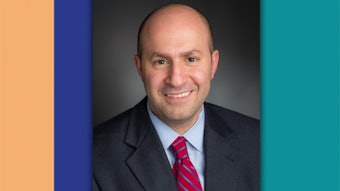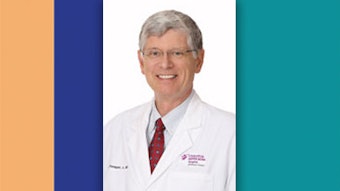The latest approaches to managing advanced prostate cancers
Session to explore differences in prostate cancer treatment that have emerged over the last 10 years

The number and variety of agents available to treat advanced prostate cancers has changed dramatically over the past decade. Thus, the AUA’s annual course on new approaches to advanced prostate cancers has evolved to address these changes.
“Agents and approaches that we are using in advanced prostate cancer in 2021 weren’t even dreamt of a decade ago when we first gave this course,” said course director Judd W. Moul, MD, FACS. “Ten years ago, metastatic castrate-resistant prostate cancer (MCRPC) was the only advanced prostate cancer state that we covered, and there were only one or two agents we could talk about. Today, we have three distinct disease states in the overarching area of advanced prostate cancer with hormonal, nonhormonal, radiation, targeted and other therapies as well as genetic testing. All the key treatment guidelines have been updated recently.”
Dr. Moul is professor of surgery at Duke University and director of the Duke Prostate Center in Durham, North Carolina. He will direct the 10th edition of AUA’s annual topic, “What's New in the Management of Hormone Naïve & Castrate-Resistant Prostate Cancer: A Case-Based Session for Urologists, Advanced Practice Providers and Teams” on Sunday. Joining Dr. Moul will be Laurence I. Karsh, MD, FACS, attending urologist and director of research at The Urology Center of Colorado in Denver, and Evan Y. Yu, MD, professor of medical oncology at the University of Washington School of Medicine and Fred Hutchinson Cancer Research Center in Seattle. Both bring decades of experience and a multidisciplinary approach to the course.
Advances in diagnostics, evaluation and treatment have expanded the definition of advanced prostate cancer from MCRPC to include two new disease states: hormone-sensitive metastatic prostate cancer (HSMPC) and nonmetastatic castrate resistant prostate cancer (M0CRPC). Each is a distinct entity, Dr. Moul said, and each has a distinct set of management approaches and clinical trials.
The course is based on treatment guidelines from the AUA, the American Society of Clinical Oncology and the National Comprehensive Cancer Network. All three groups have updated their advanced prostate cancer guidelines, some as recently as 2021. Surveys of clinical practice suggest that up to 40% of men with advanced prostate cancer are not receiving a standard of care based on guidelines.
“We’d like to see, at least among the urologic community, a larger percent of these advanced prostate cancer patients treated as per the guidelines,” Dr. Moul said. “New treatments that we are going to be talking about have been proven to help men live longer. We know that patients in certain areas are not getting the most appropriate treatments and their survival rates, sadly, are not as good as they could be.”
Those who attend Sunday’s session can expect the latest data and recommendations on abiraterone, enzalutamide, apalutamide, daralutamide, radium-223 and Sipuleucel-T, plus a briefing on systemic chemotherapy, PARP inhibitors, Lu-177 and emerging immunotherapy. The course is designed to update practicing urologists and advanced practice providers as well as oncology nurses, oncology pharmacists, medical oncologists, radiation oncologists and their support staffs.
“We have broken the course into these three areas, HSMPC, M0CRPC and MCRPC, because it’s easier for clinicians to identify different phases of advanced prostate cancer and understand the treatments for each of them than to start with treatments and work back to the different disease states,” Dr. Moul said. “We have a seasoned, experienced faculty who are sensitive to making the information digestible in two hours, keeping it case-based and focused on clinical needs.”
The AUA has also designated this course for Audience Response System use.
Visit AUA2021 Daily News Online for more articles.











